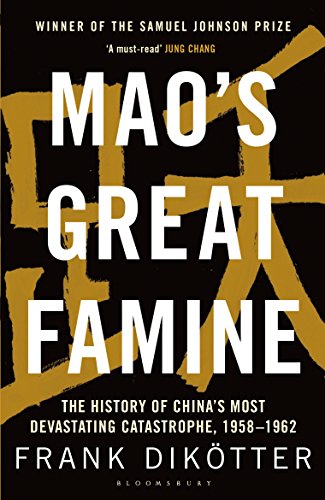Frank Dikötter’s Mao’s Great Famine is a groundbreaking and deeply disturbing historical investigation into one of the 20th century’s most harrowing human catastrophes: the famine that struck China during the Great Leap Forward, from 1958 to 1962. Drawing on newly opened archives, personal testimonies, and internal Communist Party documents, Dikötter meticulously details how political ideology, mass mobilization, and authoritarian governance led to the deaths of an estimated 45 million people—not just from starvation, but often from violence, overwork, and neglect.
The Great Leap Forward: A Grand Vision Turned Catastrophic
Mao Zedong’s Great Leap Forward was conceived as an ambitious campaign to rapidly industrialize China and transform it into a socialist utopia. The strategy emphasized collectivization of agriculture, the construction of backyard furnaces to increase steel production, and the creation of people’s communes that stripped individuals of private ownership.
Mao and the Communist Party projected an image of abundance and success, but behind the curtain was a gruesome reality. Local officials, terrified of being accused of lacking revolutionary fervor, inflated grain production numbers. As a result, the state requisitioned massive amounts of grain for urban areas and export, leaving rural communities with nothing. Food shortages spiraled into famine, and the communal system collapsed under its own inefficiency.
A State-Made Famine
Dikötter challenges the idea that this was a “natural disaster.” He demonstrates how the famine was man-made, exacerbated by rigid ideological policies, denial of reality, and a ruthless political climate that punished dissent. Starvation wasn’t an unfortunate byproduct—it was a foreseeable consequence of blind governance and terror.
People were forced into labor brigades, often working to the point of exhaustion and death. The communal kitchens were unable to provide enough food, and those caught stealing—even just a handful of grain—faced brutal punishment. Families were destroyed as parents watched their children starve or were themselves beaten for failing to meet quotas.
Violence and Repression
One of the most chilling elements of Dikötter’s work is his documentation of violence. Not only were people dying from hunger, but millions were tortured, beaten, or executed for infractions as minor as complaining about food shortages or stealing scraps. The Party’s propaganda machinery kept the nation in a fog of denial, and the regime used public shaming, fear, and brutality to maintain control.
Dikötter notes that around 2.5 to 3 million people were killed through torture or summary execution. Others died in labor camps or during forced relocations. In many rural areas, the breakdown of normal societal structures led to horrifying cases of cannibalism and social collapse.
Mao’s Role and the Culture of Fear
Dikötter lays direct blame at Mao’s feet, portraying him as an ideologically driven leader willing to sacrifice his people for the illusion of progress. The Party leadership, including Mao himself, often refused to acknowledge the depth of the crisis. Dissent was not only discouraged—it was criminalized. Even senior leaders like Peng Dehuai who raised concerns were purged.
The system created by Mao made it nearly impossible for accurate information to reach the top. Fear pervaded every level of governance, and lower officials had every incentive to lie. The result was a tragic feedback loop: the more the system failed, the more brutal its enforcement became.
The Legacy of the Famine
Mao’s Great Famine forces readers to confront a grim chapter of modern history that has long been underacknowledged, especially within China itself. While Chinese authorities have traditionally blamed “natural disasters” for the famine, Dikötter’s work underscores that it was policy, not nature, that killed millions.
The book also raises broader questions about the dangers of centralized power, unchecked authority, and ideology divorced from reality. It is not just a history of China but a cautionary tale about governance, truth, and the human cost of political fanaticism.
Conclusion
Frank Dikötter’s Mao’s Great Famine is a sobering and essential read for anyone seeking to understand the depths of human suffering that occurred under Mao’s regime. It is a meticulously researched and passionately argued account that sheds light on a tragedy too long hidden from the world’s gaze. By documenting this catastrophe, Dikötter not only honors the memory of the millions who perished but also reminds us of the importance of truth, transparency, and accountability in leadership.




